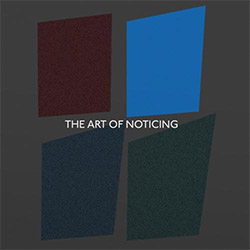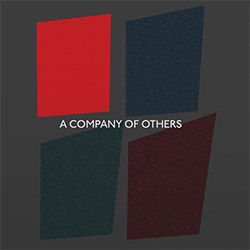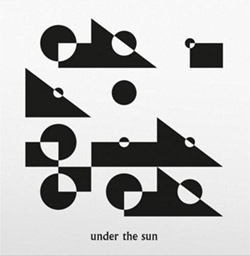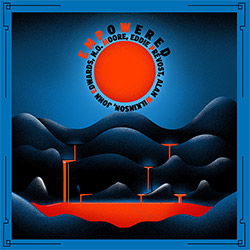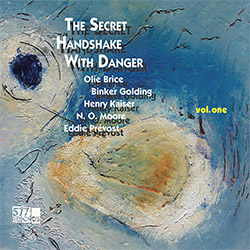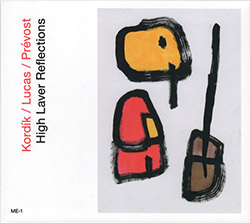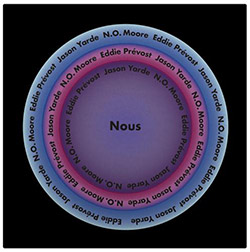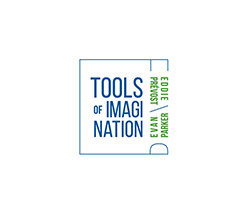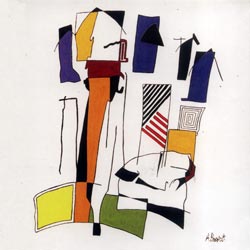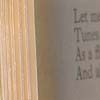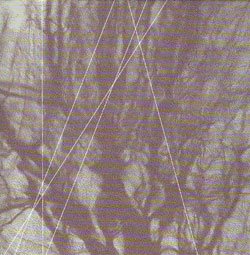
AMM percussionist Eddie Prevost playing all bowed sources in a subtle and ringing duet of bowing approaches with violinist Jennifer Allum of the London Post Quartet.
In Stock
Quantity in Basket: None
Log In to use our Wish List
Shipping Weight: 4.00 units
Sample The Album:
Jennifer Allum-violin
Eddie Prevost-bowed percussion
Click an artist name above to see in-stock items for that artist.
UPC: 502049207926
Label: Matchless
Catalog ID: MRCD79
Squidco Product Code: 14273
Format: CD
Condition: New
Released: 2011
Country: Great Britain
Packaging: Cardstock foldover
The Investigative Studies were recorded at The Welsh Chapel in London on July 13th, 2010 by Sebastian Lexer. Dolwilym Penumbra was recorded at Mwnci Studios in west Wales on October 12th, 2010 by Jethro Chaplin.
"The co-bowed industry recorded here sounds exactly as you will discover, contingent on your subsequent listens. It interrogates, employs and deploys a common system - the bow and its range of purchase.
The bows here-used follow parallel clines of provenance, from the generic to the unique. Jennifer Allum alternates two, a 17th century German and a 'conveyor-belt' bow. Eddie Prevost switches between a similarly mass-produced model and two bows of historic largesse, gifts from his friends, and erstwhile AMM colleagues, Lou Gare and Lawrence Sheaff. The latter bass bow arcs us, from now, back to the point, some time in 1966, when AMM in situ heuristics engendered an extension of the hard-bop-drum-kit norm. Prevost made the transition from discrete, percussion-struck sounds to a rhythmic practice able, suddenly, to accommodate an endless beat. He intuited the bowed sustain of, first, the arco-potential of a room's features, and naturally, soon after, cymbal edges.
Allum's even older bow harks back centuries earlier to the same late-Renaissance Mitteleuropan locale that also bore the violin she plays, and much of its historic repertoires. Her history of bowing has followed, and more recently departed from, a trajectory of violin convention of similar origin. Via the self-described repertory 'predominantly of experimental and indeterminate music post-1945' of the Post Quartet - the London string quartet of which she is a founding and current member - her music making has become increasingly concerned with, and public in, its focus on improvisation and investigation. Or, perhaps, more properly and accurately an interest in investigation through improvisation, as she explains.
"As time has gone on [my] interest in sound has remained, but has been superseded or equaled by other things. Things like language, human interaction, and politics. Improvising, to me, is another voice. I have the opportunity to develop a language that might permit me to communicate better with others. Rather like getting to know somebody, one develops the ability to (hopefully) know when not to say something, or how to say it in the 'right' way. In part this is also about knowing myself better through this kind of exploration - testing to find out where my parameters are too. It is also quite a democratic activity. In other music making ones technical ability almost always comes into it. Sometimes technical skill is a good thing, but not always, and it can often get in the way."
The nature and motives of the investigations in which she is involved are, to her,
"to do with focusing on potential - in music, in sound, and in relationships with the other musicians and my violin - and remaining alert to this. The investigation is something like working on a mental attitude to not presume, take anything for granted, and to always be open to the possibility of an alternative. For these recordings, I am surprised by how much of a constraint I found only using the bow on the violin - no fingers. So these dedicated sessions that were centered on the bow, forced me to start reexamining and reevaluating it in quite a contained way - to a greater extent than perhaps in the workshop."
Mutual study is explicit here; three of these duets are titled thus, 'investigative studies'. The fourth, longer, piece is similar in practice, if not in name. All four present the socio-sonic activity that Prevost and Allum agree is consistent with a broader, evolving investigative study encompassed by and largely shared within the weekly workshop that both regularly attend. This workshop was the site of their initial meeting; Jenny recalls first playing with Eddie there in a combination of some form, in the Autumn of 2005. Curious, she had found her way there on moving to London.
"I first came to the workshop because I was interested in the inherent qualities of sound. I had become more heavily interested in contemporary music when I was [studying] at York, but became increasingly aware that the aesthetics of High Modernism were dominating - Boulez, Birtwistle and so on - ideas that weren't even new by then! There were obviously other ways that music might happen, so I was digging around for them [...] coming in the first year or so was originally about trying to explore the boundaries of sound for myself. As I'd always played the violin this was the obvious instrument to be doing it on. I love playing my violin, but I don't always enjoy a lot of the music that goes with being a violinist."
Prevost had already been convening the workshop, to the extent that convention is an appropriate term, weekly, since the late autumn of 1999; in some ways redolent of his hebdomadal AMM work, decades previous, from which his apparatus here date. In fact, by 2005 the workshop had in a certain sense come to convene itself on Friday nights,a collective, equal exchange of ideas and energies. It was less a result of their shared weekly activity that the idea to produce this recording came about five years later, than a continuation of the on-going activity itself. For, Jenny suggests, the practice here documented is that of the workshop, 'as far as I am aware and intend'. Eddie agrees. 'After all' he adds, such activity 'is the basis of [their] musical association. The extended sessions (as it were) are a development'. Further, as such a development, they are development itself and this, in a fundamental sense, corollary to investigation, is the workshop practice.
Everywhere, the orthodox systems of our times anticipate the careful and clear presentation of ready-worked-out on-tap outcomes, throughout our lives. Said systems seldom afford focused vantage on the vagaries, protean problems, the awkward wealth, of investigation itself. Generally, the on-goings of development are hidden, edited or simply unseen; what has been developed over time is rendered public, honed for appreciation after the fact, variously knowable, reproducible and endorsable qua final product or record. So what, given its explicitly investigative, on-going nature is the thinking behind making this recorded document, this working study, public? Whence the quality, the value in listening to a man and a woman, using similar tools, explore, discover, perhaps have ideas, or not, as the case may be? Jenny's response is, as the practice, itself modally uncertain, but purposeful.
"It would be that I often find the process of something more interesting than, or equal to, the final product. I don't see this practice as having the possibility of 'private background work'. The studies are the work, which hopefully will extend across a lifetime, and this is a (form of) document of what Eddie and I did at these times."
Eddie, similarly, suggests that,
"the 'investigative nature' of the enterprise is its core aesthetic. It only becomes presentational (for an audience) after the fact. Out of this process can come a positive sonic offering that (embraces, embodies and perhaps) transcends the immediate practice of investigation. Those disposed to its philosophy may find something of interest and possibly beauty. I think this example more than sufficiently confirms these objectives and hopes."
[...]"-Seymour Wright. 2011.
Artist Biographies
• Show Bio for Jennifer Allum "Jennifer Allum is a London-based violinist specialising in experimental and improvised music." ^ Hide Bio for Jennifer Allum • Show Bio for Eddie Prevost "Eddie Prévost (Edwin John) (born Hitchin, Hertfordshire, England, 22 June 1942) is an English percussionist noted for founding and participating in the AMM free improvisation group. Of Huguenot heritage, Prévost's silk weaving ancestors moved to Spitalfields in the late 17th century. Brought up by single parent mother (Lilian Elizabeth) in war-damaged London Borough of Bermondsey. He won a state scholarship to Addey and Stanhope Grammar School, Deptford, London, where to-be drummers Trevor Tomkins and Jon Hiseman also studied. Music tuition, however, was limited to singing and general classical music appreciation. Enrolled in the Boy Scouts Association (19th Bermondsey Troop) to join marching band. As a teenager began to get involved with the emerging youth culture music; skiffle, before being introduced to a big jazz record collection of a school friend with rich parents. With a bonus from the florist, for whom Prévost worked part-time after school, purchased his first snare drum from the famed Len Hunt drum shop in Archer Street (part of London's theatre land). After leaving school at sixteen Prévost was employed in various clerical positions whilst continuing his musical interests. Although, by now immersed in the music of bebop, his playing technique was insufficient for purpose. New Orleans style jazz ('trad') offered scope for his growing musical prowess. He played in various bands mostly in the East End of London. It was during a tenure with one of these bands he met trumpeter David Ware, who also shared a passion for the hard-bop jazz music. In their early twenties they later formed a modern jazz quintet which ultimately included Lou Gare, who had recently moved to London from Rugby and was a student at Ealing College of Art and a member of the Mike Westbrook Jazz Orchestra. AMM was co-founded in 1965 by Lou Gare, Eddie Prévost and Keith Rowe. They were shortly joined by Lawrence Sheaff. All had a jazz background. They were, however, soon augmented by composer Cornelius Cardew. Thereafter, Cardew, Gare, Prévost and Rowe remained as basis of the ensemble until the group fractured in 1972. Other more formally trained musicians were to enter the ranks of AMM after Cardew's departure. Those to make significant contributions were cellist Rohan de Saram and, in particular, pianist John Tilbury. The latter was a friend and early associate of Cardew and later became his biographer. In contrast to many other improvising ensembles, the core aesthetic of the ensemble is one of enquiry. There was no attempt to create a spontaneous music reflecting, or emulating, other forms. The AMM sound-world emerged from what Cardew referred to as "searching for sounds". For Prévost, the following would become the core formulation which he would explore during his subsequent musical career and explain and develop in various writings (see bibliography) and workshop activities. We are "searching" for sounds and for the responses that attach to them, rather than thinking them up, preparing them and producing them. In the 1980s, in response to various workshops and lectures, Prévost first formulated the twin analytical propositions of heurism and dialogue as defining concepts for an emergent musical philosophy, whilst acknowledging Cardew's construction (above). This line was explored and constantly redefined much through the London workshop experience, as his articles and his books show. (see below: The London Workshop). His 2011 book - The First Concert: an Adaptive Appraisal of a Meta Music - is described as a view "mediated through the developing critical discourse of adaptionism; a perspective grounded in Darwinian conceptions of human nature. Music herein is examined for its cognitive and generative qualities to see how our evolved biological and emergent cultural legacy reflects our needs and dreams. This survey visits ethnomusicology, folk music, jazz, contemporary music and "world music" as well as focusing upon various forms of improvisation - observing their effect upon human relations and aspirations. However, there are also analytical and ultimately positive suggestions towards future metamusical practices. These mirror and potentially meet the aspirations of a growing community who wish to engage with the world - with all its history and chance conditionals - by applying a free-will in making music that is creative and collegiate." (back cover of First Concert)History with AMM When, in the early 1970s, Cardew and Rowe began to devote their time and energy to espousing the political doctrine of an English Maoist party a fracture occurred in the ensemble leaving the rump of Lou Gare and Eddie Prévost, who continued in a duo form making various concerts and festival appearances and leaving a legacy of two recordings. At the end of the decade a rapprochement was attempted and for a short while the quartet began playing together again. It did not last. Lou Gare departed and moved from London to Devon. While Cardew's commitment to politics made his complete withdrawal inevitable. It was during this period Prévost took an Honours Degree at Hatfield Polytechnic, exploring and developing his interests in history(especially East Asian) and philosophy. Musically, this left Rowe and Prévost playing together. Their recording for German ECM label "It had been an ordinary enough day in Pueblo, Colorado" is the single example of their duet period. By the late 1970s a reawakened association with John Tilbury was cemented into his permanent place in AMM. He is featured on all subsequent AMM performances and recordings (as is Prévost). In 2002 a more lasting schism occurred leading to Rowe departing from AMM and leaving Tilbury to continue with Prévost.Percussion The investigative dynamic of AMM leads a musician to seek out new material. It is the fabric and constitution of stuff that is considered as more important than any historical or cultural heritage. It is Prévost's constant exploration's that has produced the range of sounds associated with his work, particularly within AMM and its extension to the many workshop ensembles. This philosophy leads to what Seymour Wright has so aptly described as the "awkward wealth" of investigation.(citation) It is a position of constant examination and artistic redress.Drumming Drumming with AMM was principally replaced by discreet percussion work which by and large relied on sound and texture rather than rhythm. At the time of the Gare/Prévost period this position was reviewed. However, it was plain the AMM aesthetic, characteristic of the early formative period, was to have its effect. The "searching" method prevailed. And, whereas a saxophone and drums duet led to a more jazz-like expectation (amplified by Gare's reversion to a more rolling and modal post-Rollins kind of approach). Prévost's playing was noted to have acquired some unusual qualities. This lead one reviewer (Melody Maker) to remark in 1972: "His free drumming flows superbly making use of his formidable technique. It's as though there has never been an Elvin Jones or Max Roach." Drumming however, was to take a back seat in Prévost's musical output as AMM developed and began to acquire and enhance its innovative reputation. And, apart from rare musical outings he did not commit himself, more fully, to the jazz drum kit again until 2007/08. Although, continuing to play percussion, a jazz-inflected project with Seymour Wright and Ross Lambert in an ensemble called SUM was the precursor of a period more devoted to drumming. Apart from various ad hoc ensembles, this led to various recordings including a series a CDs entitled Meetings with Remarkable Saxophonists. At date this consists of four volumes featuring Evan Parker, John Butcher, Jason Yarde and Bertrand Denzler respectively.The London workshop Over the years Prévost has conducted many improvised music workshops. However, as a result of a seminar he conducted at The Guelph Jazz Festival, Canada in 1999, Prévost began to formulate a framework for a workshop based upon a more thorough working of AMM principles and practice. He wrote: "I had, of course, already had long previous experience of improvisation and experimental music mostly through my participation in AMM and working closely with the composers Cornelius Cardew and Christian Wolff. From this experience I had begun a working hypothesis in my book 'No Sound is Innocent'. However, there is always more to discover. On my long flight across the Atlantic, I intuited more could be found out. Not through introspective, if rational, thought alone but, through discovery or experimentation: praxis. It can, of course, be very discomforting to watch a proposition die in practise. No theory is worth its salt unless it is fully tested. The best ideas - this experience suggests - emerge through activity. Hence, the working premise of the improvisation workshop had to be based upon an emergent set of criteria constantly tested within the cauldron of experience. In November 1999 I made it known that a free improvisation workshop would start weekly in a room at London's Community Music Centre, near London Bridge. Originally, under the auspices of the London Musicians' Collective, [...] these premises were found and minimal lines of communication to possible interested parties were opened. The first Friday evening (not thought to be an auspicious evening of the week because people 'went out' to have a good time) duly arrived. The room was available precisely because no one ever hired it on a Friday! I waited. Edwin Prévost, The First Concert: an Adaptive Appraisal of a Meta Music, (2011) p.115/6 Since then the workshop has continued weekly. It has a strong collegiate atmosphere. Those who participate are themselves formulating and refining a programme of enquiry and empathy. The working premise is one of 'searching for sounds' (Cardew). The emphasis is upon discovery and not on presentation. It is a place to risk failure and develop an open and continuing processive relationship with the materials at hand and other people. As hoped and anticipated, Prévost's continual presence is no longer required. In his occasional absences senior colleagues (in particular Seymour Wright and Ross Lambert) more than adequately move the project along. To date there have been over five hundred people who have attended the weekly workshop in London, representing over twenty different nationalities. This activity is further augmented by occasional forums for discussion and London's Cafe OTO programmes ensembles drawn from the London workshop every month. There have also been occasional extended periods of collective workshop musical experimentation. And, in 2010 there was a residential workshop held in Mwnci Studios on the Dolwillym Estate, west Wales. (see various other texts: including Philip Clark's Wire piece)] There are now workshops based upon this general premise functioning in Hungary, Greece, Slovenia, Japan, Brazil and Mexico. Mostly started by alumni of the original workshop in London.Intermediate and experimental compositions Cardew's 'Treatise' etc. Cardew's introduction to AMM in 1966 owes something to his search for musicians to perform his (then unfinished)193 pages long graphic score, 'Treatise'. The AMM musicians (at the time Lou Gare, Eddie Prévost, Keith Rowe and Lawrence Sheaff) seemed perfect candidates to embrace this bold work of imagination. And, with others (including later AMM member John Tilbury) all participated in the premier performance at the Commonwealth Institute on 8 April 1966 (check year!). But the initial impact of Cardew's induction into AMM was to bring a halt to his compositional aspirations. However, over the years since, AMM has had a long relationship with particular indeterminate and experimental works particularly those of Cardew - especially after his death in 1983. Most prominently 'Treatise'. Other favourites were 'Solo with Accompaniment', 'Autumn '60', Schooltime Compositions' and the text piece Cardew wrote particularly for AMM, 'The Tiger's Mind.' These pieces (which for a long time had been neglected within 'new' musical schedules), and occasionally others by Christian Wolff and John Cage, were sometimes played in conjunction with an AMM improvisation. Some concert promoters were, it seems, more interested in these pieces being played than the principal musical output of AMM. Hence, Prévost's ambivalence about the inclusion of such material in concert programmes. The creative search for primary performance material was diverted, in such works, in keeping with the demands of the notation or compositional scheme. This inevitably prevented the musician from (to use Cardew's own words) "being at the heart of the experiment". (Cardew, 'Towards an Ethic of Improvisation; CC R p. 127).Matchless Recordings and Publishing In 1979 Prévost began the recording imprint of Matchless Recordings and Publishing. Although there had been some interest by commercial labels to take on the new improvising music of the late 1960s onwards, it proved not to be satisfactory or long-lasting. Together with a number of similar initiatives, e.g. Incus Records in Britain and ICP (?) in the Netherlands, Prévost sought to take control of their own work. In the early years this was slow and painstaking work. Some years little was produced and few small sales accrued. Gradually however, Matchless recordings began to be the documenting and disseminating base for a developing body of work. Most of the AMM output is featured on Matchless and this has diversified (more so in recent years) to include other associated artists and ensembles.[see matchlessrecordings.com] In 1995, following the same principal for internal control over the output, production and dissemination of material, the publishing imprint Copula was inaugurated. The first publication was Prevost's No Sound is Innocent. Later followed by Minute Particulars in 2004. 2006 saw the publication of Cornelius Cardew: A Reader (edited by Prévost) which was a collection of Cardew's published writings accompanied by commentaries by a number of musicians associated and inspired by Cardew. This volume was an essential companion to John Tilbury's comprehensive biography Cornelius Cardew: a life unfinished which was also published by Copula in 2008. The most recent book to appear on this imprint is Prévost's The First Concert: An Adaptive Appraisal of a Meta Music (2011). Eddie Prévost is the cousin of the ex-docker shop-steward and left-wing political activist also named Eddie Prevost." ^ Hide Bio for Eddie Prevost
4/10/2024
Have a better biography or biography source? Please Contact Us so that we can update this biography.
4/10/2024
Have a better biography or biography source? Please Contact Us so that we can update this biography.
Track Listing:
1. Investigative Study I 8:45
2. Investigative Study II 9:21
3. Investigative Study III 11:00
4. Dolwilym Penumbra 37:10
Matchless
Improvised Music
European Improv, Free Jazz & Related
Percussion & Drums
Stringed Instruments
London & UK Improv & Related Scenes
Free Improvisation
Duo Recordings
Instant Rewards
Search for other titles on the label:
Matchless.



